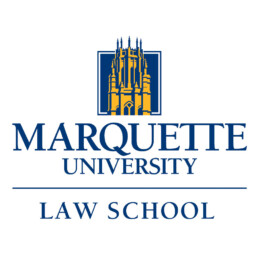Mosaic IP Law and Policy Roundtable Conference
The Mosaic IP Law and Policy Roundtable connects IP scholars with political activists, practicing attorneys, community organizers, and policy makers to produce activist scholarship, to collaborate on various IP Empowerment policy initiatives and projects, and to otherwise help to shape and effectuate a progressive and contemporary IP socio-legal agenda.
Program News & Updates
3/19/2024 – Thank you to all who joined us for the 2023 Mosaic Conference! Missed us? Check out the event recap blog here.
2024 Conference Details
Co-hosted by Marquette University Law School
Date: November 1-2, 2024
Time: 9:30 am – 3 pm CDT + Happy Hour
Location: Milwaukee, WI
Theme: Looking Forward, Looking Back: IP Social Justice & Promoting Human Ingenuity
About the Conference
Each IP Mosaic Conference is typically organized around a specific IP social justice legal issue, policy, or socio-economic challenge. Representative conference themes include equitable access to health, medicines, knowledge, and information; socially beneficial application of information technology and related advances to IP development and dissemination; legal protection for traditional and indigenous knowledge and expression; and promoting IP awareness, education, and entrepreneurial and socio-political empowerment in marginalized communities. The conference format is principally comprised of paper or project presentation sessions and plenary panel discussions. In addition, keynote presentations and “incubator project” and work in progress sessions are also mainstays of the conference.
Co-hosted by Marquette University Law School

2024 Theme | Looking Forward, Looking Back: IP Social Justice & Promoting Human Ingenuity
The IP Mosaic Conference is a unique convening of a diverse collective of academic scholars, policy leaders, and activists who meet to consider and critique IP protection. As we look back on 10 years of the IP Mosaic Conference and revisit the place where it all began, we reflect on the progress we’ve made in the last decade and consider where we go from here. One major evolution in IP law and policy is that the social justice obligations and effects of the IP regime are not questioned and this fundamental principle is now part of the prevailing scholarly and political discourse. In this Tenth Anniversary convening of IP Mosaic we will endeavor to consider what else has changed over the past decade? What remains the same? Has the way we think about humanity and creativity, and how IP protection can serve to foster human actualization towards society’s ultimate benefit changed? And what does progress look like moving forward?
Recent News & Updates
9/1/2023 – Thank you to all our sponsors, speakers, and attendees for their support of the 2022 conference! View the details from last year’s event here.
Past Conferences
7th Annual IP Mosaic Conference 2021
6th Annual IP Mosaic Conference 2020
Find the full Mosaic conference event archive here.
Program Agenda
Friday, November 1
9:30 – 9:45 am CDT
2:30 – 2:45 pm GMT
Welcome & Remarks
Joseph D. Kearney, Dean and Professor of Law, Marquette University Law School
9:45 – 10:50 am CDT
2:45 – 3:50 pm GMT
Plenary Session: The New WIPO Treaty on Intellectual Property, Genetic Resources and Associated Traditional Knowledge: Origins, Context and Significance
Moderator: Metka Potočnik, Senior Lecturer in Law, University of Wolverhampton, Law School and Director of The F-List for Music CIC
Panelist:
Wend Wendland, Director, Traditional Knowledge Division, World Intellectual Property Organization (WIPO) and Adjunct Professor, Faculty of Law, University of Cape Town
The New WIPO Treaty 25 Years in the Making: What Does It Mean and What Happens Next?
10:50 – 11:00 am CDT
3:50 – 4:00 pm GMT
Break
11:00 am – 12:00 pm CDT
4:00 – 5:00 pm GMT
Paper Presentation Panel 1: Creation, Access, and Dignity
Moderator: Kara Swanson, Professor of Law/Affiliate Professor of History, Northeastern University
Presenters:
Michael Goodyear – Dignity and Deepfakes
Arunima Shastri and Himika Batra – Making Intellectual Property Greener: Aligning India’s Patent Regime with Environmental Sustainability through Eco-Patents
Cynthia Dahl and Vicki Phillips – Looking Forward: Data from IP Law Clinics on Their Role in Increasing Access to Justice (invited)
12:00 – 1:00 pm CDT
5:00 – 6:00 pm GMT
Meal Break
1:00 – 2:00 pm CDT
6:00 – 7:00 pm GMT
Paper Presentation Panel 2: Creation and Identity
Moderator: Betsy Rosenblatt, Professor of Law, Associate Dean for Research and Faculty Development, Case Western Reserve University Law School
Presenters:
Tim McFarlin – State-Law Authorship
Sakshi Sharma – The Scarlett Letter (of Infringement) (invited)
Sarah (Fackrell) Burstein – Ornamentality and Crime
2:00 – 2:10 pm CDT
7:00 – 7:10 pm GMT
Break
2:10 – 3:15 pm CDT
7:10 – 8:15 pm GMT
Plenary Session: From Accommodating AI to Achieving Inclusivity: Opportunities for Contemporary IP Policy
Moderator: Lateef Mtima, Professor of Law, Howard University School of Law & Founder and Director, Institute for Intellectual Property and Social Justice (IIPSJ)
Panelists:
Tony Sebro, Change.org
Meredith Rose, Public Knowledge
Derris Banks, United States Patent and Trademark Office (USPTO)
3:15 – 3:25 pm CDT
8:15 – 8:25 pm GMT
Break
3:25 – 4:25 pm CDT
8:25 – 9:25 pm GMT
Paper Presentation Panel 3: Traditional Knowledge and Social Justice
Moderator: Kali Murray, Marquette University Law School
Presenters:
Dalindyebo Shabalala – Taking Customary Law Seriously: Domestic Recognition of Traditional Knowledge
Kay Dunn – Empirical research for social justice in intellectual property and cultural creativity
5:00 – 7:00 pm CDT
HAPPY HOUR for in-person attendees
Saturday, November 2
9:30 – 9:45 am CDT
2:30 – 2:45 pm GMT
Welcome & Remarks
Lateef Mtima, Professor of Law, Howard University School of Law & Founder and Director, Institute for Intellectual Property and Social Justice (IIPSJ)
9:45 – 11:15 am CDT
2:45 – 4:15 pm GMT
Paper Presentation Panel 4: Student IP Scholars Roundtable
Moderator: Tuneen Chisolm, Associate Professor of Law, Howard University School of Law
Presenters:
Samantha Lai, J.D. Candidate 2025, UNLV William S. Boyd School of Law
Expanding Creative Horizons: Fair Use of Celebrity Portraiture
Commentator: Betsy Rosenblatt, Professor of Law, Associate Dean for Research and Faculty Development, Case Western Reserve University Law School
Usayd Siddiqi, J.D. Candidate 2025, Emory University School of Law
Butter Chicken to Big Data: Preventing Excessive Protection in Sui Generis Regimes
Commentator: Metka Potočnik, Senior Lecturer in Law, University of Wolverhampton, Law School and Director of The F-List for Music CIC
Christelle Tchaou, J.D. 2024, Howard University School of Law
Systemic Solutions for Systemic Racism: Proposing an Equitable Fair Use Defense to Patent Infringement as a Part of Reparations to Historically Underserved Communities
Commentator: Kali Murray, Professor of Law, Marquette University Law School
11:15 – 11:25 am CDT
4:15 – 4:25 pm GMT
Break
11:25 am – 12:30 pm CDT
4:25 – 5:30 pm GMT
Paper Presentation 5: TBD
Moderator: Lateef Mtima, Professor of Law, Howard University School of Law & Founder and Director, Institute for Intellectual Property and Social Justice (IIPSJ)
Presenters:
Thomas Doty – Generative AI Bias Accelerates Technological Cultural Divergence
Betsy Rosenblatt – Social Justice implications in Schedule A trademark litigation
Bhamati Viswanathan – Feminist IP: A Comparative Approach
12:30 – 1:30 pm CDT
5:30 – 6:30 pm GMT
Meal Break
1:30 – 2:55 pm CDT
6:30 – 7:55 pm GMT
Paper Presentation Panel 6: Intellectual Property Theory and Social Justice
Moderator: Kali Murray, Marquette University Law School
Presenters:
Eden Howard (Wednesday Eden) – The ‘Unpropertizable’ Public Domain in UK and EU Copyright Law
Metka Potočnik – Humanity of Songs
— 5 min Break —
Justin Koo – De-Colonizing Copyright Law
Akshat Agarwal – Enabling Creative Production
2:55 pm CDT
7:55 pm GMT
Closing Remarks
Lateef Mtima, Professor of Law, Howard University School of Law & Founder and Director, Institute for Intellectual Property and Social Justice (IIPSJ)
Thank you to our Conference Planning Committee!
Conference Planning Committee
Jasmine Abdel-Khalik, University of Missouri-Kansas City School of Law Kali Murray, Marquette University Law School
Tuneen Chisolm, Howard University School of Law Metka Potocnik, University of Wolverhampton, Law School
Betsy Rosenblatt, Case Western Reserve University Law School Jack Lerner, UC Irvine School of Law
Lateef Mtima, Howard University School of Law Kara Swanson, Northeastern University School of Law
Since 2014, IIPSJ has sponsored the IP Mosaic Conference. Through the IP Mosaic, IIPSJ collaborates with a law school host to provide a venue in which to explore the social ordering function of IP protection in the total political economy, particularly the law’s social justice obligations in promoting human rights and actualization, cultural and technological progress, and self-determination and nation-building.
The IP Mosaic Conference was established to bring together scholars, law and policy makers, and social activists of diverse and multicultural backgrounds and perspectives to explore progressive, social justice-oriented ideas in intellectual property law, policy, and social activism. Beginning in the late twentieth century, digital information technology and other innovations sparked a paradigm shift in scholarly assessment of the social ordering function of IP protection, exposing the need to critically examine the law’s social justice obligations in promoting human rights, self-determination, cultural progress, and nation-building and evolution. IP law and policy makers traditionally value scholarly analyses in their development and interpretation of IP protection. Progressive, social justice-oriented IP scholarship, especially when infused with the experience and insights of policy makers and social activists, can provide the doctrinal basis for shaping a more socially responsible IP legal regime.




